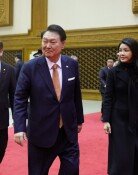Nations Divided Over North Strategy
Nations Divided Over North Strategy
Posted November. 20, 2006 07:21,
With the end of the Asia Pacific Economic Cooperation (APEC) summit on Sunday, whose main agenda was the North Korean nuclear issue, relevant countries are accelerating their movement. Measures for the upcoming six-party talks to resolve the North Korean nuclear issue have also been outlined in a series of talks held between participating countries of the six-way talks during the APEC summit. In particular, analysts believe the participating countries reached a consensus on the carrot and the stick that they would provide to North Korea during the six-party talks in return for dismantling the communist regimes nuclear weapons program.
Analysts believe the U.S., South Korea and Japans decision to take corresponding measures for the Norths dismantlement of its nuclear weapons can be interpreted to mean that they decided to resolve the issue based on what was once promised in the September 19 Joint Statement of last year.
Under the joint statement, North Korea agreed to dismantle all its nuclear weapons and nuclear programs including its 5-megawatt nuclear reactor, return to the Non-Proliferation Treaty (NPT), and allow International Atomic Energy Agency (IAEA) inspectors to visit suspected sites in exchange for a supply of heavy oil, 2 million kilowatts of direct electricity supply from South Korea, and normalization of diplomatic ties with the U.S.
However, analysts believe that North Korea will be hard-pressed to carry out initial actions involving prompt, yet verifiable measures that lead to the dismantlement of its nuclear weapons. Analysts believe that since North Korea has already conducted a nuclear test, compensation is now likely to follow gradually after the North takes an action first, clearly indicating its intention to dismantle the nuclear weapons program.
The question is how tough nuclear dismantlement procedures will be imposed on North Korea as its initial actions. Generally, nuclear dismantlement procedures consist of freezing, reporting, verification and dismantlement of nuclear weapons.
The position of the U.S. is that freezing is not enough for resumption of heavy oil supply. In particular, some analysts believe the U.S. may demand the North to dismantle its nuclear arsenals or move them to a third country right away considering it had already demanded the North the three-phased process of reporting, verification and dismantlement of nuclear weapons in the six party talks held in November 2005.
However, many analysts point out that North Korea is unlikely to agree on carrying out such rigorous initial actions, given that it has already conducted a nuclear test. They argue that the North will try to receive as much incentives as possible such as energy supply and security guarantee before it carries out initial actions.
Analysts believe that North Korea may not accept the idea of carrying out initial actions but, instead, demand a nuclear disarmament talk, claiming it a nuclear power. In addition, if the North strongly demands to unfreeze its accounts in Banco Delta Asia (BDA), a Macau-based bank, despite that the U.S. and North Korea have agreed to discuss the issue at a separate working level talk, the six-party talks is likely to be deadlocked again
During the three-party talks, the U.S. and Japan emphasized the importance of demanding a high level of initial actions to North Korea while South Korea said the level should be reduced to a feasible level that North Korea is likely to accept.
Moreover, experts believe that the five member countries of six party talks participated in the APEC summit have turned out to have much discrepancy of opinion regarding the initial actions they will impose on North Korea. For instance, during the bilateral summits between the South Korea and China, and South Korea and Russia, the three leaders drew up a conclusion that the U.S. should be more flexible in its attitude toward North Korea, showing their different attitude toward the North with the U.S. and Japan.
weappon@donga.com







